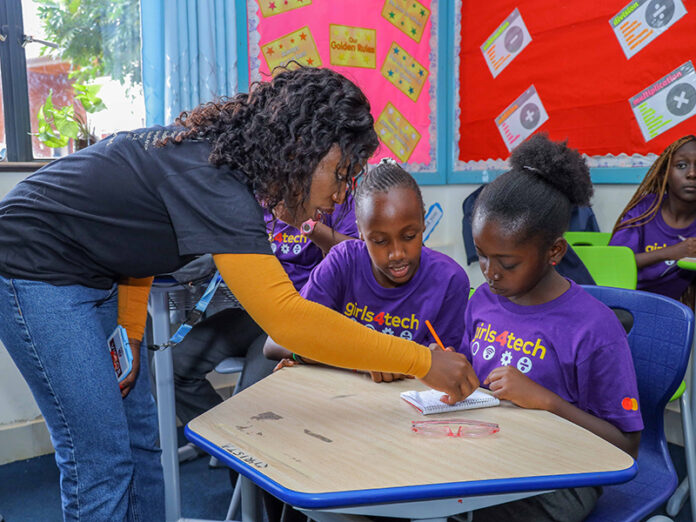As part of its commitment towards embracing equality, Mastercard recently hosted its second Girls4Tech Marathon in South Africa and Kenya, which was aimed to inspire and prepare girls aged 7-12 to pursue careers in Science, Technology, Engineering, and Mathematics (STEM).
Launched in 2014, Mastercard’s Girls4Tech education program boasts an interactive Science, Technology, Engineering, and Mathematics (STEM) curriculum based on global science and maths standards. It also incorporates Mastercard’s expertise in technology and innovation, enabling students to discover a range of STEM careers, such as fraud detection, data science, and software engineering.
The program began as hands-on, in-person sessions and workshops run by volunteers from the company’s workforce but has since expanded to include topics such as artificial intelligence and cyber security and is now available through online sessions and a digital learning experience in eight languages, including various activities such as workshops, hackathons, and mentorship programs.
This year, a total of 176 girls from South Africa and Kenya participated in this installment of the workshops. In South Africa, the workshops were fully interactive with Mastercard employee volunteers, taking the lead in creating a fun, learning environment. In Kenya, the workshops were held as a hybrid session.
“The Girls4Tech Initiative is designed to help address the gender gap in STEM fields by providing hands-on, inquiry-based activities that help girls develop an interest in STEM subjects. Stereotypes about women’s abilities start early – often in early education – and this can undermine girls’ confidence in their mathematical and technical skills. At Mastercard we remain committed to the advancement of girls in technology as we continue our journey to embrace equality through digital education,” says, Megan Clunnie, Technology Divisional lead for Sub-Saharan Africa, at Mastercard.
To date, the inquiry-based STEM program has reached over 3.5 million girls between the ages of 8 and 16 in 60 countries, and Mastercard has further committed to reaching 5 million girls globally by 2025.
Through the Girls4Tech Initiative Mastercard will continue to invest in the future of the girlchild, especially with the almost exponential growth in tech-based jobs over the past three years. That is why Girls4Tech will keep doing what it can to build the female tech workforce of the future.
“As educators of girls between the age of 7-12 years, we aim to continue showing girls that they can forge a career path in STEM fields and are just as capable as the boys at being successful in those careers. Girls4Tech is in line with our efforts to prioritize STEM subjects as part of our curriculum and we are excited to participate in this initiative,” said Daniel Muthee, Principal at Woodcreek School in Nairobi, Kenya.
“We are honored to have been selected by Mastercard, to have our learners participate in the Girls4Tech workshops, which provided them with an opportunity to expand their knowledge base by learning about all things STEM-related. Our legacy of being the oldest school in Johannesburg drives the importance of investing in and inspiring our girls to dream big, and initiatives such as Girls4Tech facilitate this. With this program, our girls get exposed to various career opportunities outside of the traditional ones, that they are familiar with,” said Natalie Bompas, Teacher at Johannesburg Girls Preparatory School, South Africa.
Although there are still gender parities that exist in technology-related fields and women in Sub-Saharan Africa only make up less than 31 percent of science researchers. Mastercard’s Girls4Tech program is challenging the status quo and forms part of a broader global commitment towards embracing equality and exposing young girls to future career prospects in STEM.




